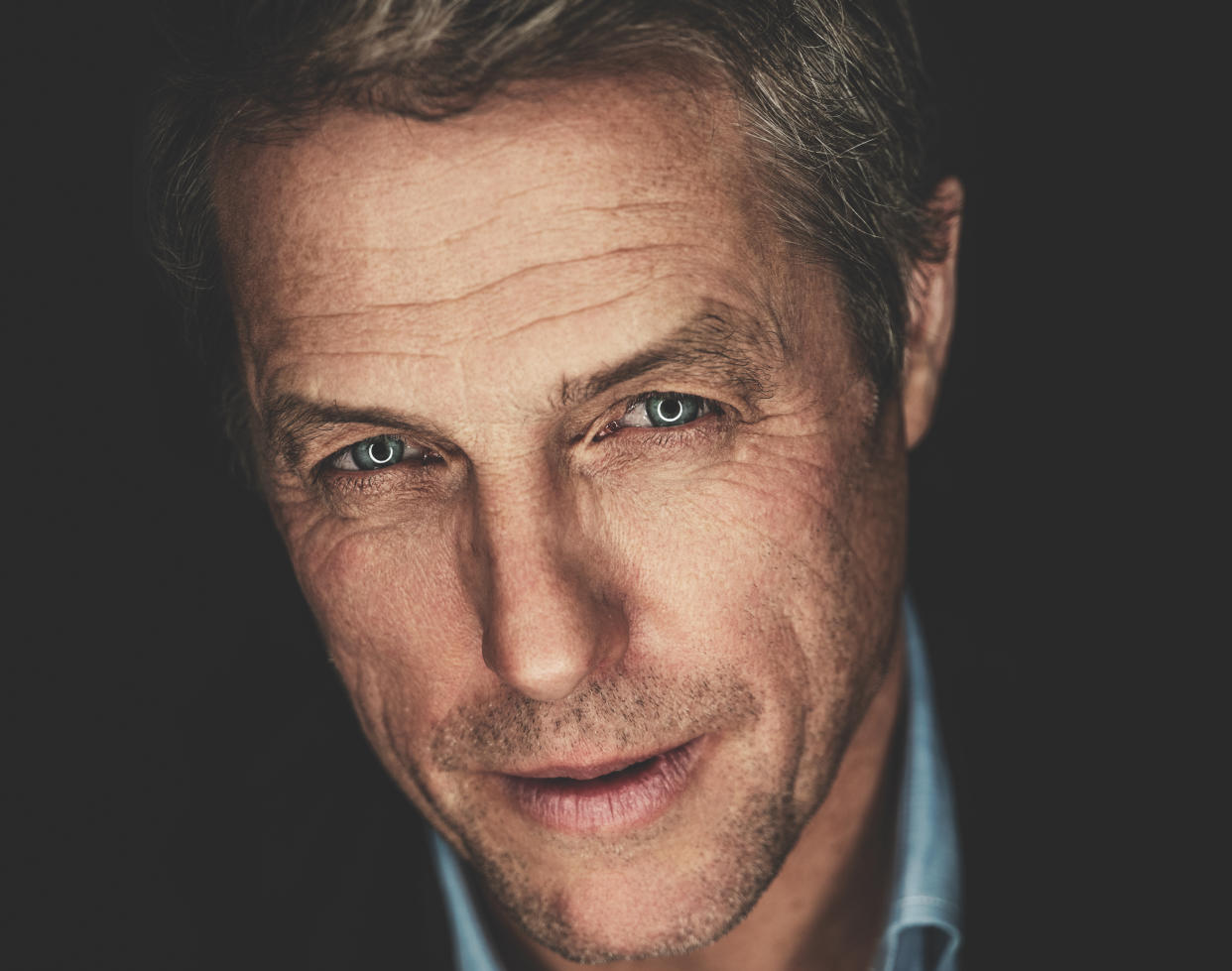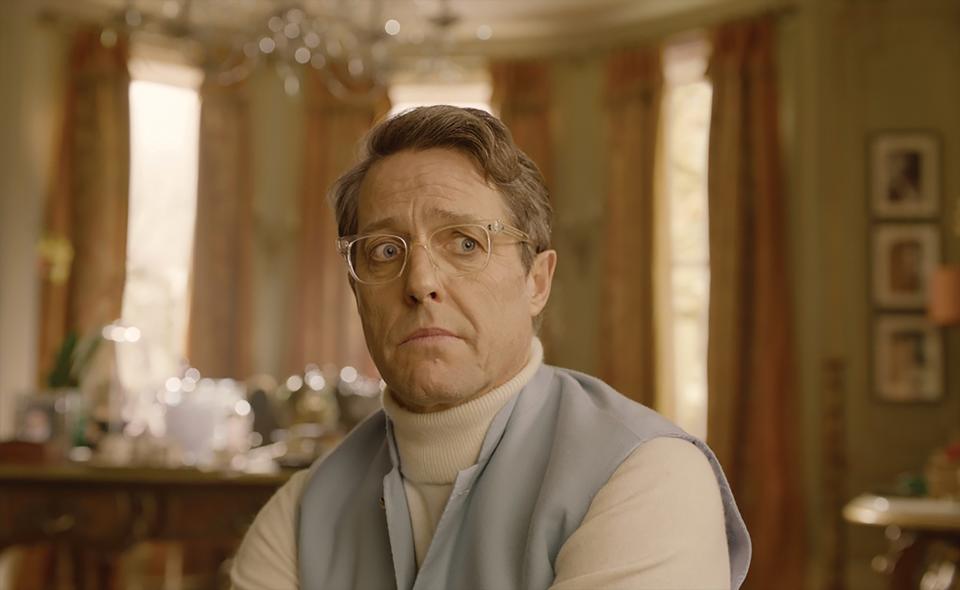The Renaissance Of Hugh Grant: Celebrating Oddities And Torturing Ben Whishaw In ‘Paddington 2’ And ‘A Very English Scandal’

Hugh Grant really, really does not like Ben Whishaw. “I want him dead,” he says, softly, as he sips on a cup of tea at the Ritz hotel in London. “He was my wife and I’ve clearly done terrible things to my wife. Then I put him in prison. I tried to kill him on a train. I seduced him, raped him, and tried to have him murdered. He’s been very nice about it.”
It might be the kind of confession he would be best advised to keep to himself, if it hadn’t all happened on screen. Grant’s homicidal leanings are just part of the job. First there was Cloud Atlas, the Wachowskis’ wonder which cast Whishaw and Grant in multiple roles, including one pairing as husband and wife. Then, this year, Paddington 2 and A Very English Scandal; two polar opposite projects that nonetheless both pitted the two actors against each other once again.
All three are creative ways in which to antagonize, but only A Very English Scandal is based in truth. In Stephen Frears’ four-part retelling of the Jeremy Thorpe scandal on Amazon, adapted by Russell T. Davies from John Preston’s book of the same name, Grant plays Thorpe, the British politician whose affair with a stable boy, Norman Scott (Whishaw), caused a sensation when it transpired that Thorpe had plotted to murder Scott to keep him from revealing their dalliance.
“From one perspective, he was a monster of narcissism and entitlement,” Grant says of Thorpe. He wrote torrents of love letters to the naïve small town boy, who was taken in by the power and celebrity of the Member of Parliament—and later leader of the Liberal Party. But when he cooled on their relationship, he cut Scott off, and the younger man began to threaten exposure. In 1960s Britain, homosexuality wasn’t just taboo, it was a criminal act. “I think it was torture for him to be born gay in a world that didn’t accept being gay. It was obviously a source of great pain and discomfort for him.”
Indeed, Thorpe married, “for politically-expedient reasons,” Grant notes. But he came to love his first wife and the child they had together before her death. “So when Norman Scott continued to threaten his life, or his position, he was also threatening those people he really loves.”
The British establishment is not unused to scandal, but the Thorpe/Scott affair is on the absurdly extreme side. The tabloid press of the time had a veritable field day when the plot to murder Scott became public knowledge. Grant remembers hearing about it as a schoolboy, when the story first broke, “and we loved it. Everyone loved it. It was like Monty Python.”
The show’s scripts find that tone, blending the absurdity of the crime with a particularly British glee that comes from catching the great and good with their pants around their ankles. It comes from Preston’s book, notes Grant, “And Russell T. Davies’ genius is that every character, even minor ones, are celebrated. He’s saying, ‘Isn’t life wonderful, that you have all these oddities?’”
It’s in these kind of characters that Grant is building the second chapter of his career. It began with another Stephen Frears joint, Florence Foster Jenkins, “and she was a freak show, but such a loving one,” Grant says. “Isn’t it amazing that a woman could be so talentless and yet so determined? It’s a celebration of the weirdness of human nature, and I think Stephen is drawn to that.”
So, too, is Grant, whose lauded turn in Florence Foster Jenkins seemed to mark a return to acting. “It’s true, I wasn’t very enthusiastic for a number of years,” he says. After a run in the 1990s and early 2000s as one of the most in-demand British actors on the planet, Grant seemed to take a conscious backseat. “I think it started as my decision, because I was still quite bankable when I decided, ‘Ugh, I can’t really face this.’” He credits the “oddities” that came along, like Cloud Atlas, or the Aardman animation The Pirates! Band of Misfits, with keeping his toes in the water, but the drive wasn’t there for him as it once had been.
“The digestive system of Hollywood is pretty fast,” Grant notes. In 2009 he made Did You Hear About the Morgans?, which failed to hit the rom-com heights he’d achieved in films like About a Boy, Notting Hill and Four Weddings and a Funeral. “I had a big failure in the genre in which I was supposed to always be successful in, and suddenly I didn’t have the career I used to have. I didn’t really mind, because I was so interested in doing other stuff.”

That included a continuing spell as a political activist. In 2011, he began campaigning in Britain against the excesses of its tabloid press, becoming active in the Hacked Off movement which called for tighter regulation of a media that had been accused of hacking the voicemail of celebrities and victims of crime in order to generate stories. “It was two things. It was the indecency of using someone who’s just lost a kid in a fire or a terrorist incident to sell their papers, and the fact that the newspaper barons were running the country. You don’t want a state run media. That’s terrifying. That’s Russia. And you have not been able to be a Prime Minister or a senior politician in Britain without obeying the diktats of Rupert Murdoch, the Barclay brothers, Richard Desmond or Paul Dacre.”
But Grant never seemed to lose his love for acting, only the detritus that came with his time as a star. When an actor complains about his privacy being invaded, it’s easy for eyes to roll, but it’s precisely the notion of drowning in somebody else’s life that so attracts Grant. “Letting go is always difficult,” he says. “To think less and actually do it. When you do, self-consciousness goes out the window and you stop worrying about yourself. I remember Emma Thompson had this crying scene in Love, Actually, and I asked her, ‘Is that something sad you dug out of your life?’ She said, ‘No, no. I’m the character and the character would cry, so I cried.’ That’s her brilliance. But the older I get, the more I realize I want to be possessed. Once you’re possessed by a character, everything else just fits.”
He has faced a barrage of obvious questions this year about his character in Paddington 2, a luvvie actor named Phoenix Buchanan, whose ego is so oversized that he can’t even bear to share a stage with a co-star. “There’s plenty of narcissism within me, for sure,” he admits. “If you happen to share one or two elements with the character, it comes alive. The camera picks it up. And anyone who has ever acted, it can only be narcissism really, even if nobody admits it. It’s always, ‘I’m really impassioned about my craft.’ Such a wanker. There’s another side of me that has always wanted to run away from that.”
Whishaw kept his distance on Paddington 2—safely ensconced in a sound booth to record his lines as Paddington (a CG bear) away from his chief antagonist. Instead, Grant was faced with a choice between an actress of Paddington’s height who could fill in on set, or a bear’s head on a stick. “It was terrifying. I couldn’t even look at it. Though, in the end, I found it was least complicated just to use the stick. I ended up becoming rather fond of the stick. And at least it couldn’t do anything bad. You do sometimes work with people, particularly in the earlier part of your career, where you’re like, ‘F*ck me. Are you really going to do it like that?’”
He sees both projects, villainous as his roles might be, as celebrations; while A Very English Scandal champions the oddities of human nature, in Paddington 2 it’s the power of positivity. “Positive is perilous stuff, and it’s something Richard Curtis has had to wrestle his entire career, because his basic message is always positive too. If you can bring it off, triple points I think. But the spirit of Paddington is very positive, and [director] Paul King really picked up on that.”
Part of the appeal of playing an outré actor came from his early days, at the Nottingham Playhouse in 1983, where Grant cut his teeth on the stage. But he demurs when I ask about the co-stars he might have based Buchanan on. “I don’t think I should name them, but it was full of marvelous old thesps from a bygone era,” he recalls. “We all still wore grease paint in those days. These old boys, with barrel voices, doing their warmups. They were very gently sexually predatory. I’ve always loved those guys.”
He affects a deep, British baritone to quote them. “‘Oh hello, Hugh. Have I caught you in your underpants again? Forgive me.’”
Related stories
Donald Sutherland To Star In HBO Limited Series 'The Undoing'
Hugh Grant To Star With Nicole Kidman In HBO Limited Series 'The Undoing'
Hugh Grant Joins Guy Ritchie's 'Toff Guys' Gang
Get more from Deadline.com: Follow us on Twitter, Facebook, Newsletter

